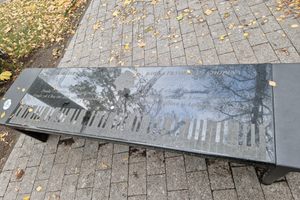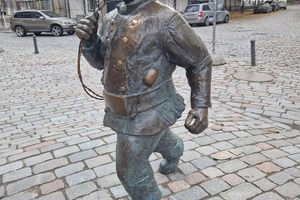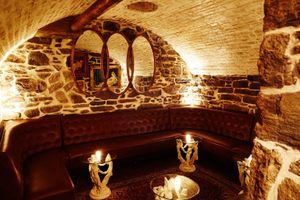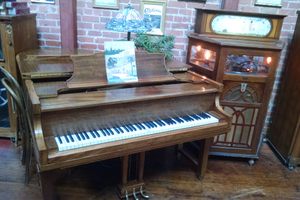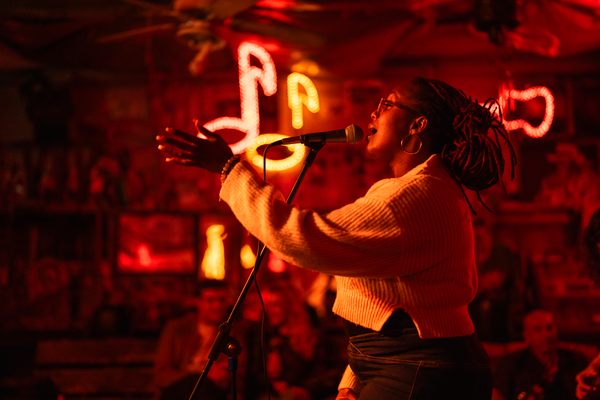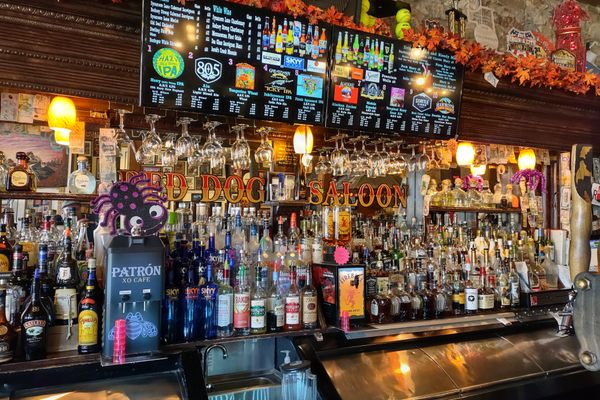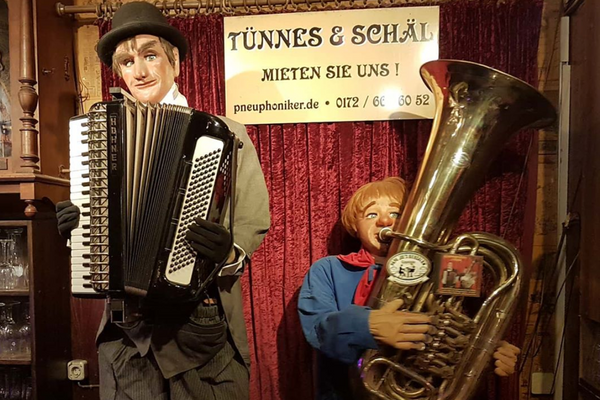About
In the cellar of a building in central Tallinn hides a tiny, cavern-like nightclub that was for decades a gathering place for Estonia’s artists, intellectuals, and activists. Its patrons and staff also played a role in the cultural uprising that led to the country winning its independence from the Soviet Union.
The KuKu Club (KuKu Klubi) was established in 1935 in the basement of the Tallinn Art Hall, built by the local arts community to house galleries and studios for the city’s creatives. Formally called the Imaginative Arts Club, or Kujutlev Kunstnikkude Klubi, the subterranean tavern quickly became a bohemian hotspot in the mold of the jazz clubs of New York and Paris. It was a place where writers, painters, and musicians could gather each evening for cheap food and drink while debating political and cultural issues with academics and agitators until dawn.
There was much to discuss. After a brief taste of independence from 1920 to 1939, Estonia was first occupied by the Soviet Union, then by Nazi Germany, and finally by the Soviets again. For the next four decades, Soviet authorities conducted mass deportations, conscriptions, and executions of the Estonian people while also suppressing their history and culture, including a ban on singing patriotic Estonian tunes.
Meanwhile, the KuKu Club quietly became an “oasis in the middle of the Soviet desert,” as Heinz Valk, an Estonian artist and activist, put it later. Valk, who for many years served as president of the club, said KuKu was more than just a nightclub; it was the birthplace of countless ideas and movements. “It can be said without exaggeration,” he wrote, “that the concentration of brilliant word masters per square meter in KuKu could not be equaled in all of Estonia."
Valk is credited with coining the term “the Singing Revolution” to describe the nonviolent, culturally based uprising against the Soviet occupation of Estonia during the late 1980s. The movement reached its apex with the Estonian Song Festival in September 1988, during which participants performed patriotic and traditional music in defiance of, and within full view of, Soviet agents and informants.
Two months later, Estonia declared its independence. In August 1989, some 2 million people joined hands to form a human chain, dubbed "the Baltic Way," that stretched 372 miles (600 kilometers) across Estonia, Latvia, and Lithuania. By 1991, the Soviet Union was no more. But Estonia still holds its song festival every five years in Tallinn, featuring performances by more than 30,000 vocalists.
In 2014, Valk wrote a memoir, The Golden Years of the KuKu Club (KuKu Klubi Kuldsed Aastad), which documents the contributions of club regulars to the independence movement. (No English translation of the book yet exists, unfortunately.)
Today, the KuKu Club remains open, known more for its live music than its revolution-inspiring conversations. The club celebrated its 85th anniversary in January 2020 with a reading by Valk and a performance by one of Estonia’s most celebrated punk-rock bands—a fitting tribute to KuKu’s history, and Estonia’s.
Related Tags
Know Before You Go
The entrance to the KuKu Club is just off Tallinn’s Freedom Square. Walking north between the square and St. John’s Church will deposit you at the front of the Tallinn Art Hall. The club doorway, marked with a small sandwich board, is to the right of the building entrance and down a narrow staircase. Don’t be confused by the ground-floor café and coffee shop, which also bears the KuKu name; the club is underground.
Community Contributors
Added By
Published
July 8, 2020
Sources
- https://www.theatlantic.com/international/archive/2015/11/estonia-music-singing-revolution/415464/
- https://www.tandfonline.com/doi/abs/10.1080/14623520903119001?scroll=top&needAccess=true&journalCode=cjgr20
- https://www.nonviolent-conflict.org/estonias-singing-revolution-1986-1991/#:~:text=Estonians%20gathered%20in%20the%20thousands,the%20support%20of%20the%20republic's
- http://www.unesco.org/new/en/communication-and-information/memory-of-the-world/register/full-list-of-registered-heritage/registered-heritage-page-8/the-baltic-way-human-chain-linking-three-states-in-their-drive-for-freedom/
- https://www.visitestonia.com/en/kuku-club#:~:text=KuKu%20Club-,KuKu%20Club,in%20the%20midst%20of%20totalitarianism.
- https://www.transartists.org/air/estonian-artists-association
- https://books.google.com/books?id=Z5AuN15X4nQC&pg=PA327&lpg=PA327&dq=kuku+klubi+Tallinn+Art+Hall&source=bl&ots=Y178DKRoeA&sig=ACfU3U2tnL5D2GNVpykFOFH3SDy0LiPt4w&hl=en&sa=X&ved=2ahUKEwi9rv3clK3qAhVUmXIEHcgiAwwQ6AEwBXoECCIQAQ#v=onepage&q=kuku%20klubi%20Tallinn%20Art%20Hall&f=false
- http://www.journalismwithoutwalls.com/wp-content/uploads/2012/11/am91cm5hbGlzbXdpdGhvdXR3YWxsc0lJV1VBUVdZLWt1a3Uta2x1Ymkta3VsZHNlZC1hYXN0YWQ
- https://books.google.com/books?id=pUawCQAAQBAJ&pg=PA413&lpg=PA413&dq=september+1988+singing+festival+estonia&source=bl&ots=Kq4OTKukR3&sig=ACfU3U24UszRfMx7bUa-bReHshTGEVLybA&hl=en&sa=X&ved=2ahUKEwjt9rWWjK3qAhX4oHIEHYZ1DwkQ6AEwA3oECAgQAQ#v=onepage&q=september%201988%20singing%20festival%20estonia&f=false
- https://www.elu24.ee/24243/maletused-oolaulupeost-heinz-valk
- https://www.kukuklubi.com/
- https://www.facebook.com/kukuklubi
- https://news.err.ee/1027848/gallery-kuku-klub-celebrates-85th-birthday















